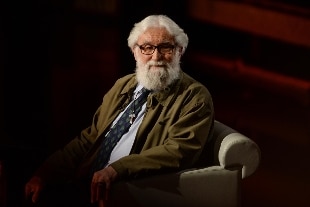Share
by Pierluigi Mele 04 May 2020 Many have clearly predicted it: after the coronavirus, it will no longer be possible to continue the project of capitalism as a mode of production, nor of neoliberalism as its political expression. Capitalism is good only for the rich; otherwise it is a purgatory or hell, and by nature a war without respite.What is saving us is not competition - its main engine - but cooperation, nor individualism - its cultural expression - but the interdependence of all and all with the whole of humanity.
But let's go to the central point: we have discovered that the supreme value is life, not the accumulation of material goods. The war apparatus we have, capable of destroying life on Earth several times, has proved ridiculous in the face of an invisible microscopic enemy that threatens all humanity. Could it be the Next Big One (NBO) that biologists fear, "the next big virus" that will destroy the future of life? We don't think so. We hope that Earth still has compassion for us and is only giving us some sort of ultimatum.
Given that the virus that threatens us comes from nature, social isolation offers us the opportunity to ask ourselves: what has been and what should be our relationship with nature and, more generally, with the Earth as a common home? Medicine and technique, although very necessary, are not enough. Their function is to attack the virus until extermination. But if we continue to attack the living Earth, "our home with a unique life community", as the Earth Charter says (Preamble), it will strike again with other deadly pandemics, up to the one that exterminates us.
It happens that most of humanity and heads of state do not realize that we are in the sixth mass extinction. So far we have not felt part of nature, nor even as its conscious part. Our relationship with it is not the relationship we have with a living being, Gaia, which has a value in itself and must be respected, but of mere use according to our convenience and for our enrichment. We are violently exploiting the Earth to the point that 60% of the soil has been eroded, in the same proportion as humid forests, and we are causing an incredible devastation of species, between 70 and 100 thousand a year. This is the current reality of the anthropocene and the necrocene. Continuing this path we will meet our own disappearance.
We have no other alternative than to make, in the words of the papal encyclical "on the care of the common home", a "radical ecological conversion". In this sense, coronavirus is not a crisis like any other, but expresses the request for a friendly and attentive relationship with nature. How can this be achieved in a world dedicated to exploiting all ecosystems? There are no ready-made projects. Everyone is looking for them. The worst thing that could happen to us would be, after the pandemic, to go back to the previous situation: the factories that produce at full speed, even if with a minimum of ecological attention. We know that large companies are organizing to make up for lost time and profits.
But it must be recognized that this ecological conversion cannot be immediate, but rather gradual. When French President Macron said that "the lesson from the pandemic is that there are goods and services that need to be removed from the market," it prompted the immediate intervention of dozens of large environmental organizations, such as Oxfam, Attac and others, who have asked that the 750 billion euros of the European Central Bank intended to remedy the losses of businesses be used for the social and ecological conversion of the productive apparatus in the interest of greater attention to nature, for more justice and social equality. Logically, this will only be done by broadening the debate, involving all realities, from popular participation in science, until a collective awareness and responsibility emerges.
We must be fully aware of one thing: with the increase in global warming and the increase in the world population, devastating natural habitats, thus bringing humans closer to animals, the latter will transmit more viruses, to which we will not be immune, which they will find in us new guests. This will lead to devastating pandemics.
The essential and inalienable point is the new conception of the Earth, no longer as a global market that places us as its lords (dominus), outside and above it, but as a living super entity, a system, self-regulated and able to self-recreate, of which we are the conscious and responsible part, together with other beings as brothers (frater). The transition from the dominus (owner) to the frater (brother) will require a new mind and a new heart, that is, to be able to see the Earth in a different way and to be able to feel with our heart our belonging to it and to the Great Universe. Along with this we must also have a sense of interrelation all and all with the whole of humanity and a collective responsibility towards a common future. Only in this way will we arrive, as the Earth Charter provides, for "a sustainable lifestyle" and a guarantee for the future of life and Mother Earth.
The current phase of social distancing can mean a kind of reflective and humanistic withdrawal to think about these things and our responsibility towards them. It is urgent and time is short, we cannot be too late.
* Leonardo Boff wrote Como cuidar da Casa Comun (How to take care of the Common House), Vozes 2018, and A opção Terra: a solução da Terra não cai do céu (Earth Option: the solution for the Earth does not fall from the sky), Record 2009 .
(Translation from Portuguese by M. Gavito and S. Toppi)
From the site: https://leonardoboff.org/2020/05/03/cosa-puo-succedere-dopo-il-coronavirus/

